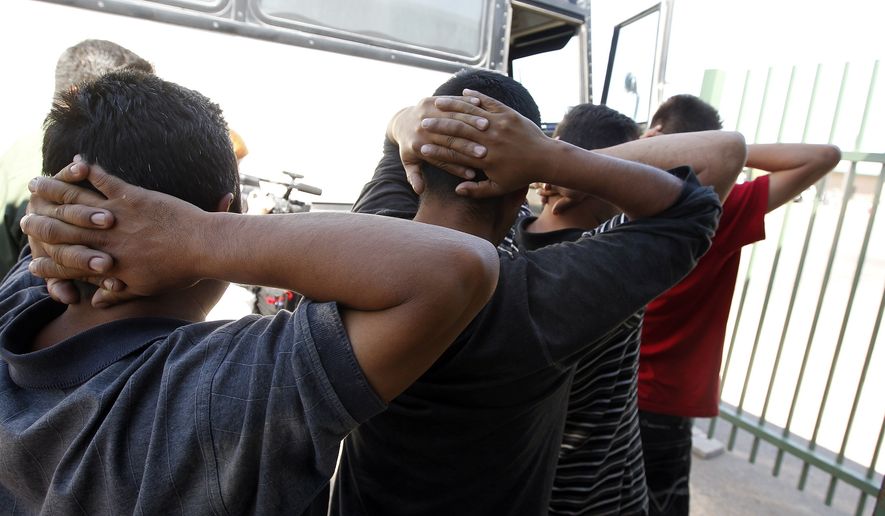The Obama administration has revived the maligned illegal immigrant “catch-and-release” policy of the Bush years, ordering Border Patrol agents not to bother arresting and deporting many new illegal immigrants, the head of the agents’ labor union revealed Thursday.
Brandon Judd, president of the National Border Patrol Council, told Congress that Homeland Security was embarrassed by the number of illegal immigrants not showing up for their deportation hearings, but instead of cracking down on the immigrants, the department ordered agents not to arrest them in the first place — meaning they no longer need to show up for court.
Mr. Judd said the releases are part of President Obama’s “priorities” program, which orders agents to worry chiefly about criminals, national security risks and illegal immigrants who came into the U.S. after Jan. 1, 2014. Mr. Judd said illegal immigrants without serious criminal convictions have learned that by claiming they came before 2014 — without even needing to show proof — they can be released immediately rather than being arrested.
“Immigration laws today appear to be mere suggestions,” Mr. Judd testified to the House Judiciary Committee’s immigration subcommittee. “That fact is well known in other countries.”
U.S. Customs and Border Protection, which oversees the Border Patrol, did not deny Mr. Judd’s claim but said agents have been instructed to prioritize whom they arrest.
“The Border Patrol’s resources are most effectively focused on the border — prioritizing the apprehension and removal of individuals attempting to unlawfully enter the United States,” said Michael Friel, a CBP spokesman. “Our removal numbers reflect that. Border Patrol agents are issuing notices to appear, consistent with law, regulation and the department’s enforcement priorities.”
The White House declined to comment. Spokesman Josh Earnest said he hadn’t seen the testimony.
Mr. Obama has pushed for Congress to grant citizenship rights to most illegal immigrants, but after Capitol Hill failed to deliver he took action on his own to carve most illegal immigrants out of danger of deportation.
He and Mr. Johnson said deportation and border agents should worry chiefly about dangerous immigrants and new arrivals. Those with deeper ties to the U.S. who have not amassed criminal records should be passed over, Mr. Obama said.
Mr. Judd said there are holes in that policy. He said agents have been ordered not to ask for proof when an immigrant says he or she has been in the U.S. since 2013, and migrants have quickly learned to assert that claim without having to worry about having it challenged.
He said on the northern border, where he is stationed, agents arrested an illegal immigrant who had recently been charged with felony domestic violence. He had to be released because he hadn’t gone to trial yet, so he hadn’t been convicted.
“Under the law, he should have been set up for removal proceedings, but under the policy he was let go,” Mr. Judd testified. “And he was let go even though he first proved that he cared so little about our laws that he entered the United States illegally, and once here, he proved further disdain by getting arrested for a serious violent act against another.”
Mr. Judd was testifying at a hearing called to examine the surge of illegal immigrants — unaccompanied children and families traveling together — who have overwhelmed agencies. After peaking in early summer 2014, the numbers dropped. But 2016 is on pace for a record year.
Mr. Judd and Jessica Vaughan, policy studies director at the Center for Immigration Studies, said criminal cartels are using the families and children to flood the border to distract agents and create chances to smuggle drugs.
The cause of the surge is heatedly debated.
Immigrant rights advocates said the children and mothers are fleeing horrific violence and should be considered asylum-seekers, not illegal immigrants. The advocates point to spiking homicide rates.
El Salvador leads the Western Hemisphere with 103 homicides per 100,000 inhabitants. Honduras is third worst with a rate of 57 homicides, and Guatemala is fifth worst with 30 per 100,000 people.
San Pedro Sula in Honduras recorded 885 homicides out of a population of just less than 800,000 people last year, according to a Mexican nongovernmental organization that tracks the statistics. San Salvador, the capital of El Salvador, recorded 1,918 homicides among its 1.8 million people — a rate of 109 per 100,000.
The U.S. city with the highest homicide rate per capita, St. Louis, recorded a rate of 59 per 100,000 inhabitants.
Wendy Young, president of Kids in Need of Defense, which handles cases of children applying for protection in the U.S., detailed horrific stories of children being enslaved by gangs, tracked down if they try to leave and being killed as retribution for crossing the gangs.
She recounted the story of one 14-year-old girl who was abducted by a gang and gang-raped for four days before she escaped. Her family fled to another location inside the country, but the gang tracked her down, and her family sent her north to the U.S.
“These children are doing the only thing they can — they are running for their lives,” Ms. Young said.
Mr. Judd said children wanting to claim asylum can go to a border entry point and present themselves to CBP officers. Instead, the cartels deliver them to some of the remote parts of the border before sending them to find Border Patrol agents, keeping the agents occupied while the cartels smuggle their goods, the agent said.
Border Patrol agents used to interview the children and ask them why they came, and the overwhelming majority said they believed enforcement was lax and they would be allowed to stay.
Ms. Young said the children were likely frightened by agents and officers in uniforms, so the information they gave was not to be trusted.
Regardless, Mr. Judd said, agents have now been banned from asking those questions.
⦁ Dave Boyer contributed to this report.
• Stephen Dinan can be reached at sdinan@washingtontimes.com.




Please read our comment policy before commenting.